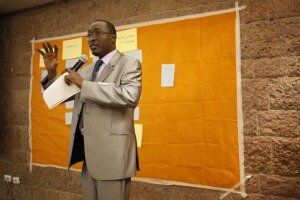From Mali to Nepal: The trail of a negotiator
 Dr. Salif Samake, Mali |
Pour lire la version française, voir ci-dessous
From the moment he heard about the MLI-sponsored training sessions in Nepal to be a better negotiator, Dr. Salif Samake wanted to go.
Samake, the director of planning and statistics for the Ministry of Health in Mali, got the go-ahead from MLI and earlier this year, he joined roughly 20 Nepali health officials for a session. At the MLI Learning Collaborative Forum today in Addis Ababa, Samake said that health leaders in the room and around the world should also get the training.
"It’s a very important skill that all of us should be good at," he said. "It’s something we do every day. Negotiation is not only valid on a
higher level in our work, but negotiation starts at home. This whole group should be aware of the skills."
And what are they are?
Good preparation, clear communication, listening well, having an open mind, and knowing what kind of outcome would be desirable for you – and for your negotiating partner, he said. "We should establish a good relationship with the person with whom we negotiate," he said. "We have to understand the dynamic of the negotiation."
In general, he said, being a better negotiator is part of being a global health diplomat. "Diplomacy in global health is growing in importance, and so I invite all of you to get familiar with these concepts in negotiations," Samake said. "Without this tool, our objectives will not be attained."
Du Mali au Népal : le chemin d’un négociateur
Dès qu’il a entendu parler des séances de formation au Népal sponsorisées par l’ILM pour enseigner de puissantes techniques de négociation, le Dr Salif Samake a voulu y participer.
M. Samake, directeur de la planification et des statistiques pour le Ministère de la Santé au Mali, a reçu le feu vert de l’ILM et, en début d’année, a assisté à une séance en compagnie d’une vingtaine de responsables de la santé népalais. Aujourd’hui, lors du Forum sur l’apprentissage entre égaux de l’ILM à Addis Ababa, Samake a affirmé que les responsables de la santé dans la salle et dans le monde entier, devraient également suivre cette formation.
« Il s’agit d’une compétence très importante que nous devrions tous maîtriser », a-t-il déclaré. « C’est une chose que nous faisons tous les jours. La négociation ne se produit pas seulement à un haut niveau dans le cadre de notre travail, elle a lieu également à la maison. Ce groupe entier devrait être conscient de l’importance de cette compétence. »
Et en quoi consiste cette compétence ?
« Une bonne préparation, une communication claire, savoir bien écouter, avoir un esprit ouvert, et savoir quel type de résultat serait désirable pour vous – ainsi que pour votre interlocuteur », a-t-il avancé. « Il faut établir une bonne relation avec la personne avec qui nous négocions » a-t-il affirmé. « Nous devons comprendre la dynamique de la négociation. »
En général, il pense qu’il incombe aux diplomates de la santé mondiale de devenir de meilleurs négociateurs. « L’importance de la diplomatie dans le domaine de la santé mondiale ne cesse de croître, je vous invite donc tous à vous familiariser avec ces concepts utilisables lors des négociations » a conseillé Samake. « Sans cet outil nous n’atteindrons pas nos objectifs. »
See video of the session below:
Live-blog from Ethiopia:
Part 1: MLI Live-blog from Addis Ababa
Part 2: ‘Its Always Good to Think Big’
Part 3: Mali’s Path to Community Health Insurance
Part 4: ‘A New Dawn’ in Health Care in Sierra Leone
Part 5: Want to Bargain? The Nepalis can Help
Part 7: Ethiopia’s New Plan: ‘It’s going to Really Improve this Place’
Part 8: Ethiopia and the Importance of Family Planning
Part 9: Gang of Four: Table Talk with Reproductive Health Directors
Part 10: Ethiopia’s Tedros: Four Steps to Owning Health Programs
Forum Wrap-up, Part 1: Marty Makinen and Amanda Folsom
Forum Wrap-up, Part 2: Rosann Wisman
Photo Credit Dominic Chavez
Keyword Search
MLI works with ministries of health to advance country ownership and leadership. This blog covers issues affecting the ministries and the people they serve.
Connect with Us
![]()
![]()
Categories
Blogs We Like
- Africa Can End Poverty
- Africa Governance Initiative
- Behind the Numbers
- CapacityPlus
- Center for Global Health R&D Policy Assessment
- Center for Global Development: Global Health Policy
- Center for Health Market Innovations
- Global Health
- Global Health Hub
- Global Health Impact
- The New Security Beat
- PAI Blog
- RH Reality Check
- Save the Children
- Transparency and Accountability Program
Contact Us
Please direct all inquiries to
